News
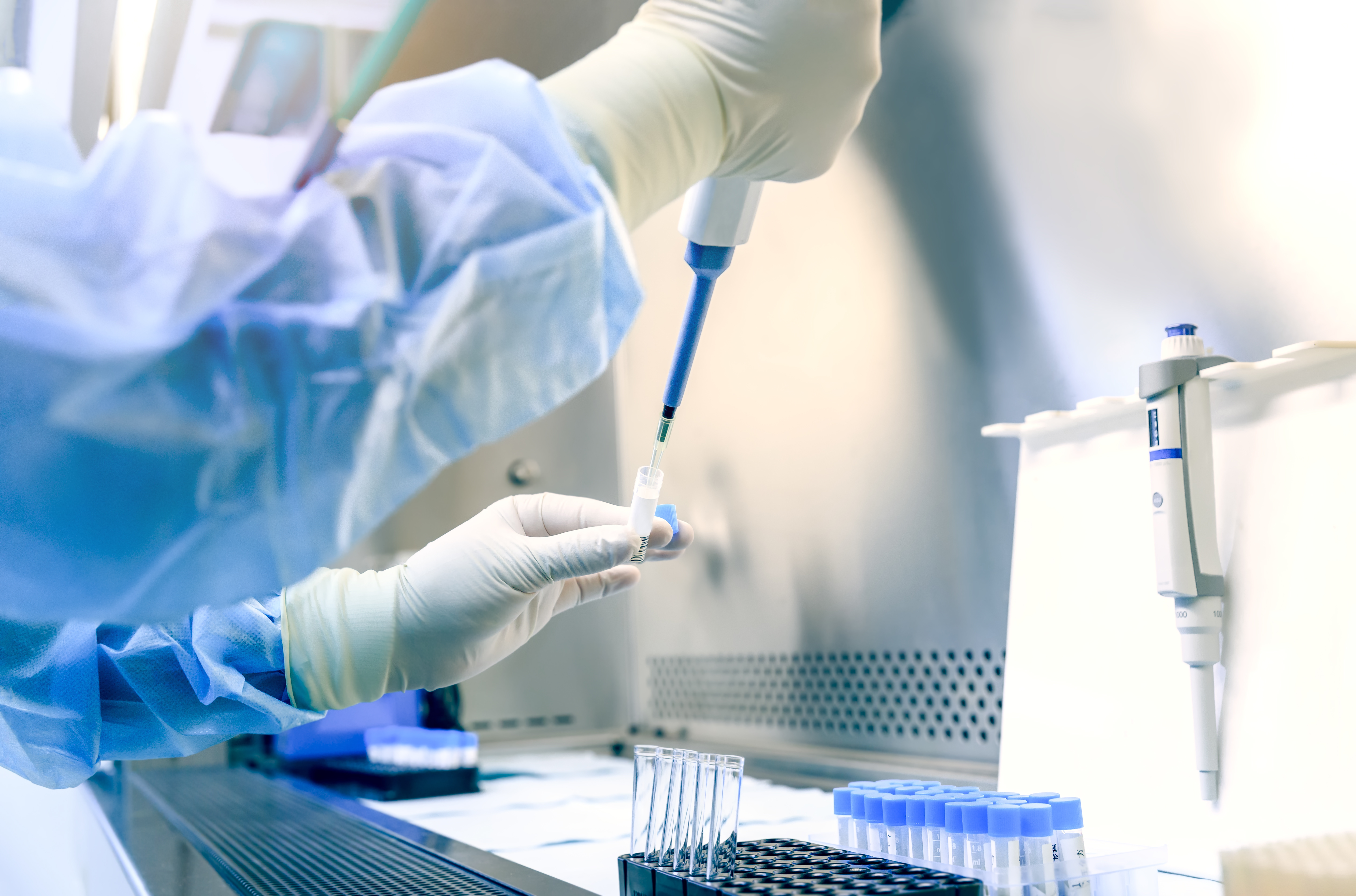
Texinfine Laboratories is proud to announce its collaboration with the LifeTech 2025 conference!
In partnership with the Applied Research and Training Academy (ARTA), the Institute for Cellular Pharmacology (ICP), and Evolve Ltd, come and discover this international event dedicated to innovation, technology, and transformation in the life sciences.
Location: Mosta Technopark, Malta
Dates: November 25-27, 2025
Info & registration: https://arta.edu.mt/lifetech-2025
Cellular pharmacology and the spirit of innovation are the keywords of LifeTech 2025, which will mark an important milestone for international research and collaboration in the sector.
Join researchers, professionals, and thought leaders for three days of conferences, networking, and scientific discoveries!
.jpeg)

ICP is now ISO9001:2015 certified
The Institute of Cellular Pharmacology Ltd (ICP) is now
ISO 9001:2015 certified:
International standard based on quality management principles with a strong customer orientation.
.jpg)
Partenariat RUN FOR PLANET
Laboratoire TEXINFINE is proud to announce that we are a partner of RUN FOR PLANET, the 1st French eco-designed race for the planet.
The aim of the race is to raise public awareness of ecological, social and ethical challenges, and to raise funds for committed associations.
Click on the cities to find out more: BORDEAUX - PARIS - LYON
Since 2018, ICP (Institute of Cellular Pharmacology) has been eligible for Research Tax Credits and has recently successfully obtained its renewal as an approved R&D facility by the French Ministry of Higher Education, Research and Innovation for the coming years.
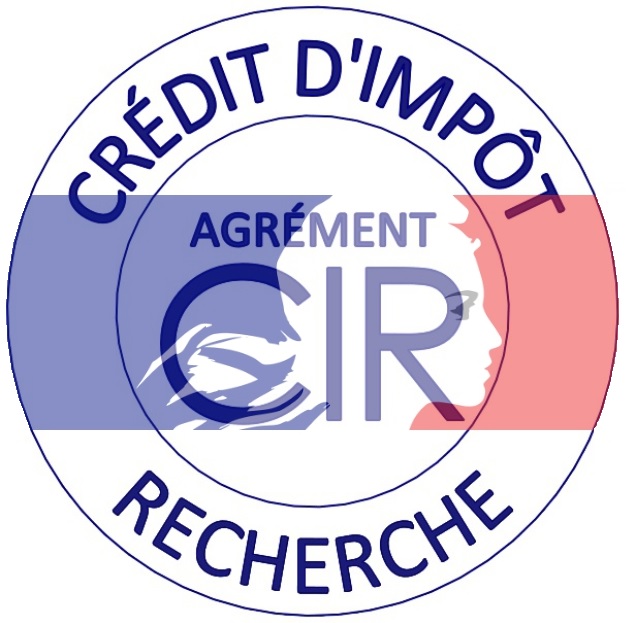
A new step forward for Texinfine, ICP and Texinfine Tahiti!
2021 - ICP is now certified COSMOS for the manufacturing and processing of raw materials
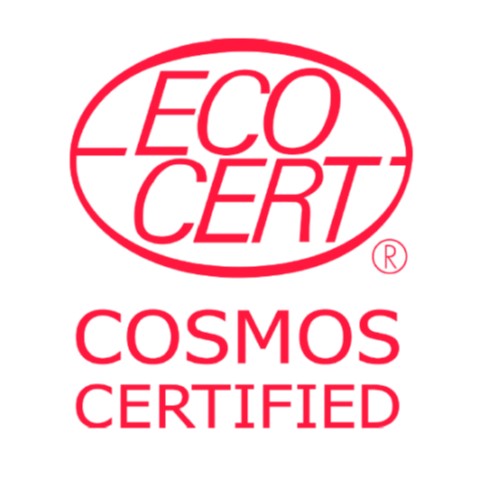
The Informed Sport mobile App has arrived!

Find PRESERVATION® 400 and its active ingredient TEX-OE Opuntia Mesocarp Extract® certified by Informed Sport.
The benefits of prickly pear for athletes of all disciplines and all levels.
- Ensures a better resistance of the body subjected to intensive and recurrent efforts.
- Accelerates the recovery and repair of the body subjected to intensive and recurring efforts.
Meet TEXINFINE and PRESERVATION® with its active ingredient TEX-OE Opuntia Mesocarp Extract®, at the DIGITALE Week of Vitafoods Europe, the International Nutrition Fair from 11 - 15 May 2020.
Resulting from our research, PRESERVATION® is a dietary supplement containing the natural extract of prickly pear mesocarp, TEX-OE, Opuntia mesocarp extract® to accelerate and increase the synthesis of essential proteins, the HSPs, to the proper functioning of our immune system and thus ensures optimal protection.
Discover also Articles, Podcasts, Webinars on the themes: latest trends in nutraceuticals, Sports Nutrition, Immunity, Probiotics, Joint Health, ... but also on climate change and Sustainable Development.

PRÉSERVATION®, resulting from the research and production of ICP and TEXINFINE Laboratories, is a dietary supplement with prickly pear mesocarp extract that helps protect our body against external aggressions by increasing and accelerating the production of essential proteins, the Heat Shock Proteins (HSPs).
Like the prickly pear, which resists extreme thermal exposure, our organism has similar tools capable of ensuring its defence and survival. However, in the face of aggressions, especially those from viruses, this mechanism can be exhausted and our immune system becomes deficient.
By acting early, the prickly pear mesocarp extract (TEX-OE, Opuntia mesocarp extract®) contained in PRÉSERVATION®, reinforces the immune response by stimulating and making HSPs more effective.
---> Read more <---
Viruses play an essential role in the evolution of species and contribute to our good health and development. Sometimes viruses (like all other infectious agents) can be harmful to our health, in this case we speak of pathogenic viruses. A healthy organism has many tools in place to detect and defend itself in the presence of an infectious agent such as viruses. Our bodies contain a few kilograms of viruses and bacteria called symbiotic bacteria that are essential to our lives. We host more bacterial cells than we have cells of our own.
The natural response to a non-self
When a compound enters our body, it will first be identified as a non-self-antigen. Its potential dangerousness will then be determined by different physiological mechanisms. If the intruder is recognized as potentially dangerous, a series of metabolic cascades will be set up, among which an inflammatory reaction will undoubtedly be the first phase. Other phases will consist of "marking" the intruder and then destroying it. One of the substances developed by our body is a well-known protein molecule called antibody. These are proteins that bind to a specific part of the antigen and will mark it, allowing killing agents (macrophages, NK, etc.) to recognize it in a specific way in order to swallow or destroy the "foreign agent". All these reactions are called immune responses.
Interests of Heat Shock Proteins or HSPs
These are patterns called "antigens" that allow our bodies to recognize a foreign agent. This identifier will make it possible to mark it thanks to an antibody. The antibody is a substance developed by the B lymphocytes of our body to bind specifically and exclusively to a part of the antigen. Curiously enough, antibodies are produced in a random way. This means that we can produce antibodies against substances that do not exist today. Once the antibody is fixed on the antigen the immune reaction can take place. Our body will then have to neutralize the intruder, destroy it, or eliminate it. All these substances are of protein nature. They are functional thanks not only to the sequence of amino acids (sequence) but also thanks to a good conformation (stereospecificity) of them. It is known that a good sequence will not necessarily give the right response (activity) to infectious agents if the conformation is not correct.
The amino acid sequence is regulated by protein synthesis and conformation is given by Heat Shock Proteins, HSPs.
Numerous studies and scientific articles highlight the protective role of HSPs in strengthening the immune system and during a viral infection [1; 4; 6; 7-8; 11-12; 15]. HSPs can act as molecular chaperones1, participating in protein synthesis, folding, transport, cell viability and modulating the immune response. HSPs thus play an important role in both innate and adaptive immunity [4; 7-8; 11]. A study published in 2004 in the Journal of Virology demonstrates in particular how Hsp70 blocks the replication of certain viruses such as seasonal influenza [6]. Viral infections, fever, hypoxia or exposure to radiation are sources of cellular stress, physiological disturbances whose response through increased production of HSPs plays a key role in maintaining our well-being [5]. It is therefore important to ensure this maintenance support and the early implementation of HSPs in order to respond as quickly as possible to any type of threat to our body.
Nature is our powerful ally in improving our well-being.
In cell culture (human cells) as in many animal species, the interest of the prickly pear TEX-OE, Opuntia mesocarp extract®, in the accelerated availability of HSPs and the importance of these proteins in improving well-being has been widely studied and demonstrated by the scientific community of TEXINFINE but also internationally [2-3; 9-10; 13-14].
Resulting from our research, PRÉSERVATION® is a dietary supplement containing the natural extract of the prickly pear mesocarp, TEX-OE, Opuntia mesocarp extract®, which accelerates and increases the synthesis of essential proteins, HSPs, for the proper functioning of our immune system and thus ensures optimal protection.
Each manufacturing batch of this extract is tested in cell culture in order to guarantee the good quality and above all the biological effectiveness of the product.
"Seeking in Nature the best ways of maintaining our well-being"
Gilles Gutierrez
Doctor of Pharmacy
------
Bibliography
- High Heat May Kill the Coronavirus. The Benefits of Heat-Shock Proteins. https://www.lewrockwell.com/2020/03/joseph-mercola/high-heat-may-kill-the-coronavirus/
- Boerrigter J.G., H.W. van de Vis, R. van den Bos, W. Abbink, T. Spanings, J.Zethof, L.L. Martinez, W.F. van Andel, J. Lopez-Luna, G. Flik, Effects of Pro-Texon zebrafish (Danio rerio) larvae, adult common carp (Cyprinus carpio) andadult yellowtail kingfish (Seriola lalandi), Fish. Physiol. Biochem. 40 (2014) 1201–1212.
- Brahmi, D., Bouaziz, C., Ayed, Y., Ben Mansour, H., Zourgui, L., & Bacha, H. (2011). Chemopreventive effect of cactus Opuntia ficus indica on oxidative stress and genotoxicity of aflatoxin B1. Nutrition & metabolism, 8, 73.
- DeDiego, M. L., Nieto-Torres, J. L., Jiménez-Guardeño, J. M., Regla-Nava, J. A., Alvarez, E., Oliveros, J. C., Zhao, J., Fett, C., Perlman, S., & Enjuanes, L. (2011). Severe acute respiratory syndrome coronavirus envelope protein regulates cell stress response and apoptosis. PLoS pathogens, 7(10), e1002315.
- Dewhirst M., Stauffer R. P., Das S., Craciunescu I. O., Vujaskovic Z., (2016) Chapter 21 - Hyperthermia,Editor(s): Leonard L. Gunderson, Joel E. Tepper, Clinical Radiation Oncology (Fourth Edition),Elsevier,Pages 381-398.e6
- Hirayama E., Atagi H., Hiraki A. and Kim J. (2004). Heat shock protein 70 is related to thermal inhibition of nuclear export of the influenza virus ribonucleoprotein complex. J Virol. Feb;78(3):1263-70.
- Moseley P. (2000). Stress proteins and the immune response. Immunopharmacology; 48:299–302.
- Nollen EA, Morimoto RI. (2002). Chaperoning signaling pathways: molecular chaperones as stress-sensing ‘heat shock’ proteins. J Cell Sci. ;115:2809–2816.
- C.D. Parker, C. Prins, C. Saliba, G. Gutierrez, M. Serrar (2014) Effect of TEX-OE® treatment on the development of heat shock proteins in commercial broiler chicks and the impact on performance indicators in the grow-out period, Br.Poult. Sci. 55 592–597.
- R.J. Roberts, C. Agius, C. Saliba, P. Bossier, Y.Y. Sung, Heat shock proteins (chaperones) in fish and shellfish and their potential role in relation to fish health: a review, J. Fish Dis. 33 (2010) 789.
- Robert J. (2003) Evolution of heat shock protein and immunity. Dev Comp Immunol.; 27:449–464.
- Santoro M.G., Amici C., Rossi A. (2009) Role of Heat Shock Proteins in Viral Infection. In: Pockley A., Calderwood S., Santoro M. (eds) Prokaryotic and Eukaryotic Heat Shock Proteins in Infectious Disease. Heat Shock Proteins, vol 4. Springer, Dordrecht.
- Somers, D.j ; ; Giroux R. W. & Filion, W. G. (1991). The expression of temperature-stress proteins in a desert cactus (Opuntia ficus indica). Genome. 34. 940-943. 10.1139/g91-145.
- Sung Y.Y., R.J. Roberts, P. Bossier, (2012) Enhancement of Hsp70 synthesis protects common carp Cyprinus carpio L., against lethal ammonia toxicity, J. Fish Dis.35 563–568.[55] S. Tenreiro, M.C. Munder.
- Török Z., Crul T., Maresca B., Schütz J. G., Viana F., Dindia L., Piotto S., Brameshuber M., Balogh G., Péter M., Porta A., Trapani A., Gombos I., Glatz A., Gungor B., Peksel B., Vigh L., Csoboz B., Horváth I., Vijayan M. M., Hooper L. P., Harwood L. J., Vigh L., (2014), Plasma membranes as heat stress sensors: From lipid-controlled molecular switches to therapeutic applications, Biochimica et Biophysica Acta (BBA). Biomembranes, Volume 1838, Issue 6, Pages 1594-1618.

Naturally boost your immune system
Our immune system plays an essential role in protecting our body and preserving our cells from threats such as viruses and bacteria.
However, this defence system remains fragile and essential protection can thus become insufficient. In this situation, it is important to support our body to strengthen our immune defences.
The Prickly Pear extract of PRÉSERVATION® accelerates and increases the synthesis of proteins* essential to the proper functioning of our immune system.
Further strengthen your natural defences by combining Prickly Pear, your natural shield and Tahitian Vanilla, the black gold of French Polynesia!
The Tahitian Vanilla extract of DNA-PKASE®Inhibat comes from a plant capable of preventing the alteration of its genetic information.
* Heat Shock Proteins (HSPs)
.jpg)
Dietary supplements:
our active ingredients put to the fore !
EPP™
Extract of Padina pavonica (Padine)
EPP™ restores the synthesis of collagen and elastin in the dermis, the connective tissue underlying the epidermis. Smoothing effect assured.
&
TEX-OE®
TEX-OE® offers the body a new toolbox against cellular stress.
Art. Marie Claire - Food supplements: the most effective anti-ageing molecules !

A Meeting in Polynesian Land
An implantation in Polynesia that is bearing fruit !
On the occasion of a visit by Mr Gilles Gutierrez, Mr Bernard Joyeux (Deputy General Manager), a meeting was organized between Mr Guillaume Le Coz (General Manager Texinfine Tahiti), Mr Edouard Fritch (President of French Polynesia), and Mrs Sylvana Puhetini (First Vice-President of the Assembly of French Polynesia).
During this trip, our laboratory took the opportunity to thank President Fritch for all the support of the country for the project to enlarge the new operating unit (valued at 300 million francs CFP) in Opunohu (Moorea).
Art. The Presidency of French Polynesia
Lyon biopôle network integration
On February 26th, 2020, we joined the Lyonbiopole network (Competitiveness cluster focused on pharmaceutical activities, particularly in the fight against human and animal infectious diseases and cancers).
His role
Bringing together a community of 226 public/private actors :
6 founding members of the cluster: 4 major manufacturers (Sanofi Pasteur, bioMérieux, Boehringer Ingelheim Santé Animale, BD), the CEA and Fondation Mérieux,
202 innovative SMEs, start-ups and ETIs
18 Competence Centres (University Hospitals, Universities, Foundations...).
His activity revolves around 5 main missions :
Stimulate innovation,
Promote the economic development of members,
Accompany them in their internationalization,
Enable them to take advantage of industrial infrastructures to grow their projects,
Enhance the value of the entire ecosystem through communication actions.
They are talking about us ... From Lyon to Malta, through the valorisation of the "fenua" and the plants from French Polynesia
-- When the Prickly Pear extract, TEX-OE, opuntia mesocarp extract® arrives in the United States (December 10 and 23, 2019)
"Announcing the Little Known Benefits of an Amazing Fruit Extract That Offers Protection from Hangovers, Physical Stress, Jet Lag and Diving Fatigue"
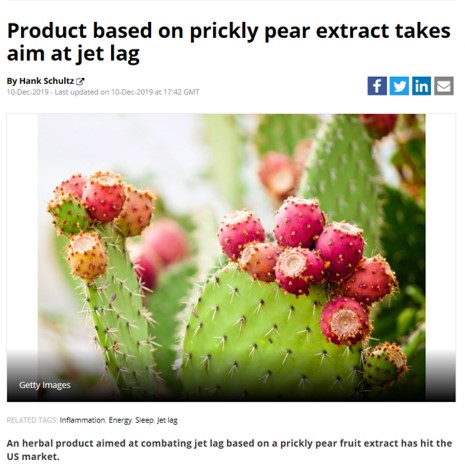
-- Our products in CNEWS and in "Le Progrès" of November 19, 2019

-- Articles in " Le Progrès " and CNEWS of November 5, 2019
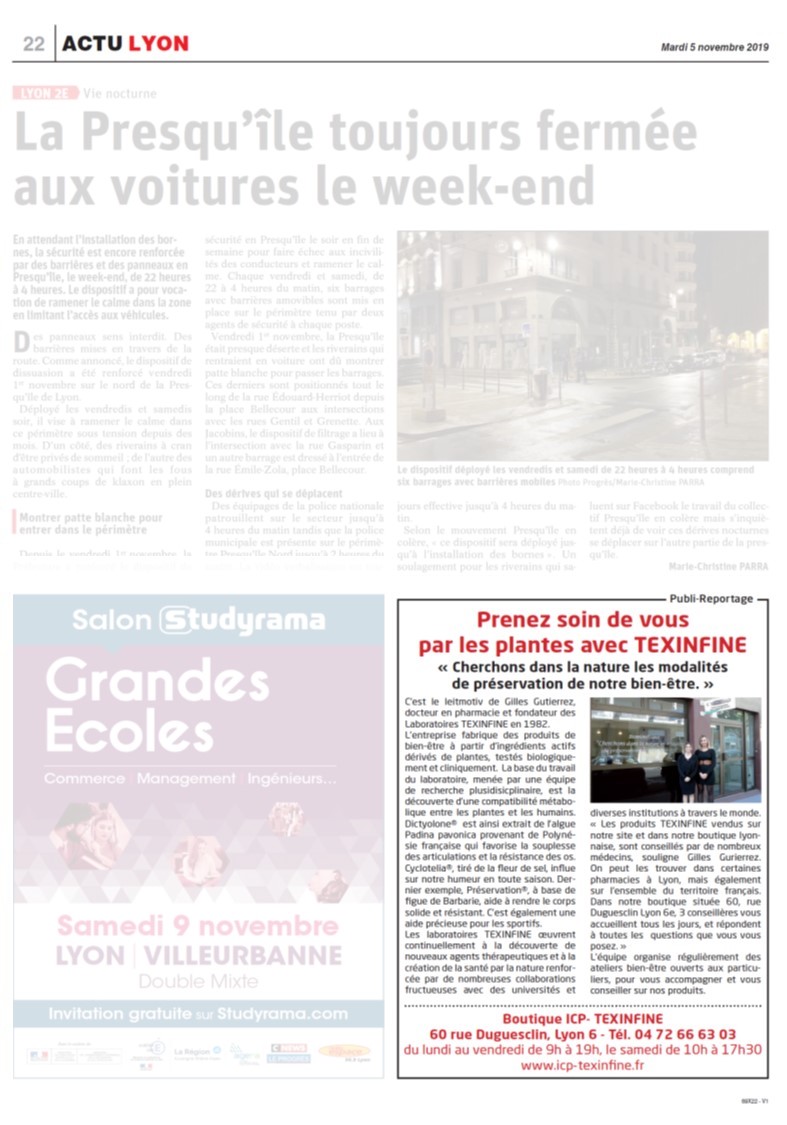
-- France Focus - Special edition in Times of Malta June 2019
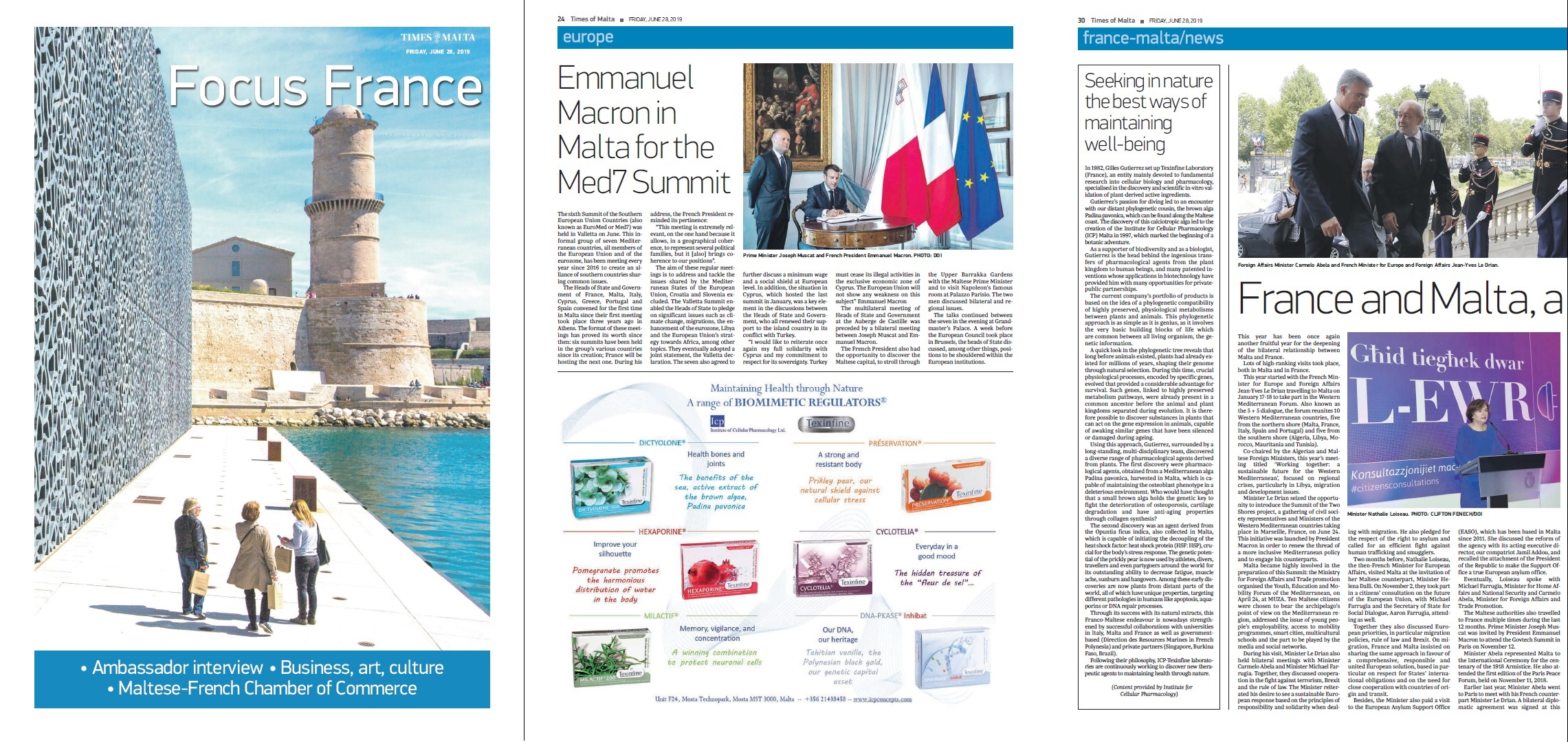
-- Collaboration between an italian research center Sbarro Health Research Organisation (SHRO) and ICP (June 2019)
https://timesofmalta.com/articles/view/head-of-top-us-cancer-research-centre-visits-icp.716244
-- Cooperation between the public institution of Tahitian Vanilla and ICP-Texinfine (August 2017)
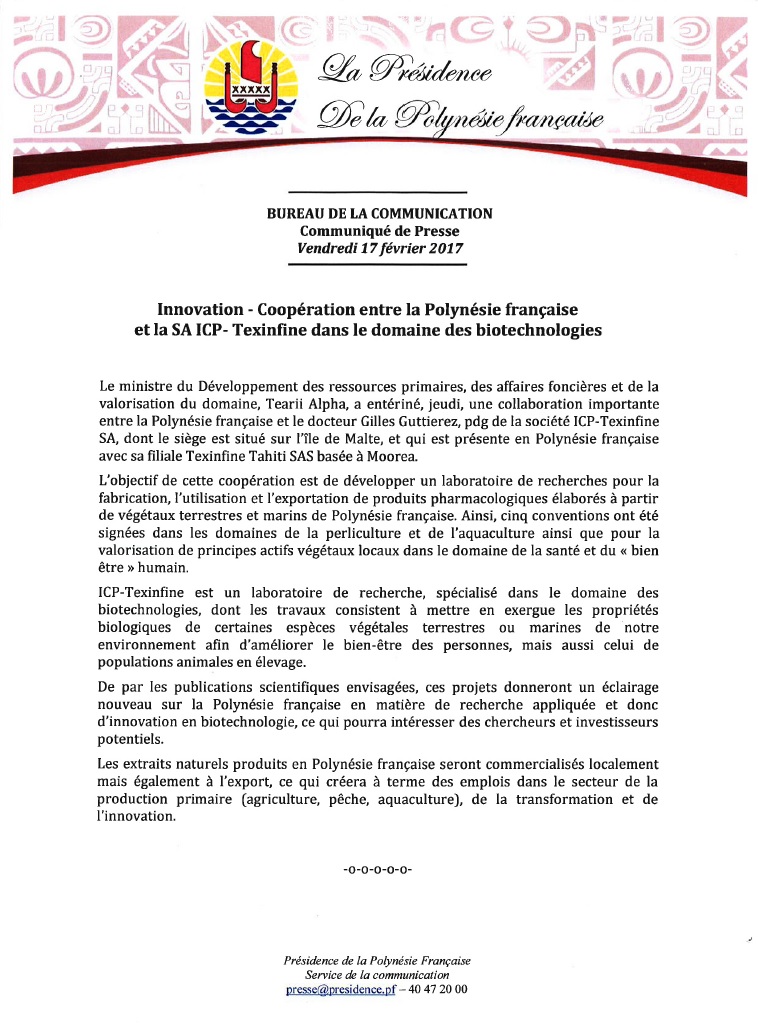
-- Cooperation between the public institution of Tahitian Vanilla and ICP-Texinfine (August 2017)
-- ICP-Texinfine will study vanilla (August 2017)
https://tribunedelyon.fr/2017/08/30/2748/
-- From biotechnologies to pearl farming and aquaculture ... cooperation between the Direction des Ressources Marines (DRM) and ICP-TEXINFINE (July 2012)
-- The discovery of Maltanedienol, a molecule from the algae Padina pavonica (April 2004)
https://www.independent.com.mt/articles/2004-04-23/local-news/A-molecule-made-in-malta-65552




.jpg)
.jpg)



